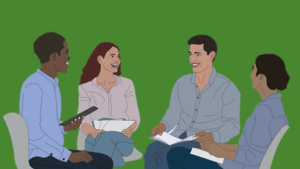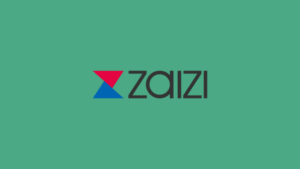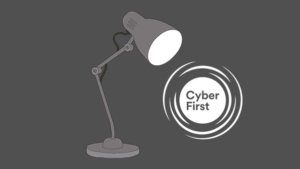
What it’s like to interview for a job at Zaizi
We’re hiring at Zaizi and we want to hear from you. Here’s what you can expect from a job interview – and some tips on how to succeed.
Preparing for a job interview can be a nerve-wracking experience. What should you put in your portfolio? Will there be a live task? Should you expect a gotcha question?
You shouldn’t have to guess the answers to these questions. At Zaizi we want to make sure that people are given everything that they need to succeed. That’s why we want to be transparent with you about what it’s like to interview at our company, and make the process simple, clear and anxiety-free.
We try to make a job interview quite a relaxed environment
Nat Hinds, Zaizi talent manager
Because of the kind of work that we do, there are a few fundamental features on your CV that will stand you in good stead for a career working at Zaizi. A star candidate will:
- have experience in a GDS or public sector background
- be comfortable working in digital environments
- be security cleared – or be eligible for security clearance (find out what that means)
All that is important, but it’s not the full story. As well as finding out what you’ve done, we want to get to know you as a person. “We try to make a job interview quite a relaxed environment,” says Nat Hinds, Zaizi’s talent manager. “Learning what you’ve done is important to us, but we also want to learn what you’re like as a human and how you’ll fit in at the company.”
We’re not here to catch you out. We want to see what you enjoy and what makes you tick, because ultimately that’s what will make you succeed.
Before the job interview: What we want to see in your CV or portfolio
- Tell us about outcomes, not just output. It’s important to show your process, and demonstrate how your work contributed to the success of a project
- Keep your portfolio simple. We don’t need your everything you’ve ever worked on, just three or four recent projects that best show your experience
- Evidence of what you’re like as a person. We want to hear about soft skills, hobbies and the things that make you, well, you
- Don’t sweat it – clarity is always more important than flashy design work
What the job interview process is like
A job interview for a full time position at Zaizi generally consists of three rounds.
The first round will be a conversation with one of our recruiters. In it, they’ll ask a few questions about your work history and you’ll get a chance to ask questions about the company.
The second round of a job interview will typically be a chat with a hiring manager. They will want to know about your skills and processes and answer more complex questions about the position.
The third round will be some kind of presentation or live test. Being able to confidently present your work is important, adds Nat Hinds. “We are a consultancy, so everyone will have to speak to a client at some point.”
What you’ll have to do in a presentation or live test
Derek Hulley, head of engineering
Hires: Developers, test engineers, cloud engineers, solution architects
“Our presentation briefs are fairly open-ended. We’ll give a scenario and we’ll ask the candidate to give a presentation on what they recommend.
“For instance, a solution architect will be asked to respond to a scenario relating to transformation of architecture. We don’t dictate anything – broadly, we’re looking for people who can think on their feet and we allow candidates to steer the conversation towards the technologies and techniques that they are good at and enjoy doing. We like to see people getting a little bit carried away when the right topics turn up.”
Steven Maclellan, head of product
Hires: Product managers, service designers, user researchers, UX designers
“I will ask a candidate to walk me through an example of work that they’re proud of. I want to see them explaining what they did, what they learned, and what they could or would have done differently.
“I’m really looking to understand what gets the candidate excited, so I can understand what gives them a kick. They don’t have to be sure about that, but if there’s a particular phase of the project or aspect of the job that they love, then it really helps us. I appreciate self-awareness. If a candidate says: ‘I want to do more of this, and I want the opportunity to do this, but to get there I need this from you, or this kind of training…’ – I think that’s great, and it helps me understand where they fit in a team.”
Andrew Hawkins, head of sales
Hires: Client managers, bid managers, marketing professionals
“Presentation stage is all about identifying where a candidate has added value before, their understanding of the public sector and getting their thoughts around how they can add value to our clients and market.
“We’re passionate about working in the public sector, so I am looking for candidates that share that desire to work with organisations that are all different, often under severe pressures and responsible for policies and services that impact us all. We don’t have all the answers, so the presentation stage is great for getting candidates to talk about their ideas on how we could do things better and increase the value we are making. I am also keen to assess how candidates balance being in results-driven positions with our aim to be a highly collaborative and trusted partner for our clients.”
Madhava Muvva, lead test engineer
Hires: QA roles
“In QA we need to make sure we have enough test coverage at all levels in a project – manual testing, automation testing, performance testing and accessibility testing. If a candidate has skills in security testing, that’s an added bonus.
“When I look at a CV, I’m looking for candidates who have got knowledge of Selenium with any of the frameworks, like Nightwatch.js, Robot-framework or Cypress. They should be able to write scripts in Cucumber BDD. The frameworks differ – the syntax may be different, the language may be different. But we look for a candidate who can understand the whole test process and can work in a continuous delivery environment.
“At a presentation stage, we’ll ask candidates to talk about their experience in agile scrum methodology. It’s important that candidates can communicate clearly when demonstrating to a wider audience. For the live task, we ask candidates to write an automation test, a simple test you can write in 45 minutes. They can work in any framework they are comfortable with and run it in any browser they like. Then, I would look at the test they have written, and the standards they followed. Some people can do it, some can’t, but I would look at the standards they followed and make sure their style of writing tests may not create any bottlenecks in the QA process, and so on. We need to see if people can cope and handle the pressure.”
Jim Rippon, principal cloud engineer
Hires: Cloud engineering roles
“In our Cloud Engineering team, there are a few key competencies that we try to assess at the second-stage interview with the hiring manager. This involves a series of questions covering some of the core technical skills we use in our day to day work. For example you might expect to be asked some questions around AWS, Containers, Scripting, Kubernetes and CI/CD.
“The technical questions will include a mix of specific questions about a particular tool or technology, some hypothetical problems to understand how you’d deal with a situation, and some opportunities to give an example of something you’re particularly proud of in your career so far.
“Our aim is to make sure you have the right level of understanding of the core things that are required to build solutions for our clients, and help us make sure we support you in improving any areas that would make your job in the team easier.”
We’re always recruiting at Zaizi! Head over to our careers page and browse our open roles. All roles are 100% remote for the foreseeable future and we will accept applications from anywhere in the UK.
-

My first Regional Scrum Gathering in Stockholm – key takeaways
-

Why diversity is good news for government – and good news for Britain
-

Realising potential: Guiding local youth towards fulfilling futures
-

Zaizi 2023 review: Thought leadership and insights in digital government
-

From Literature to IT – Career switches are worth it!
-

What’s it like being on a CyberFirst scheme placement with Zaizi?
